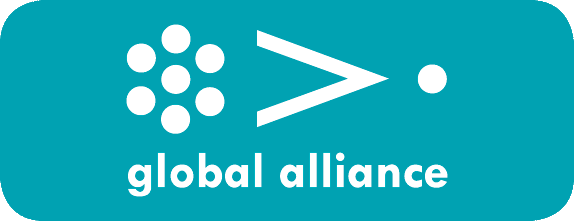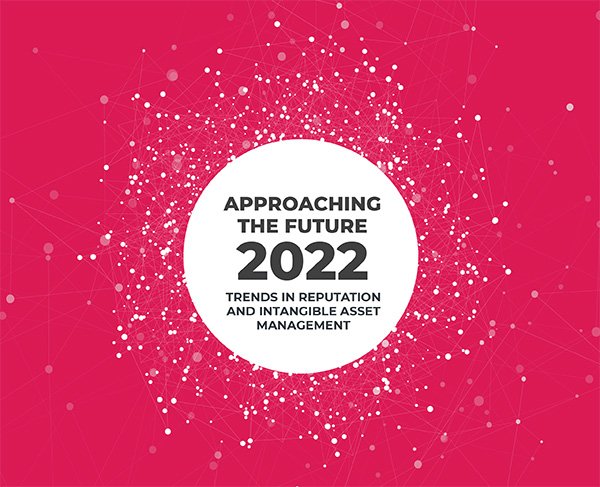The biggest trends in intangible asset management: Approaching the Future 2022 is available
Society demands greater commitment from companies, and managing reputation and intangibles is now a strategic must for all businesses
Close to 50% of companies are working to define and integrate purpose in their business, and four in ten are working to drive responsible leadership and improve diversity, equity, and inclusion.
The 2030 Agenda has regained relevance among organisations as compared to last year, with a commitment to aligning sustainability strategies with the SDGs, while climate action and ESG investment are of less interest.
The 7th edition of this annual report, produced by Corporate Excellence - Centre for Reputation Leadership, CANVAS Estrategias Sostenibles and Global Alliance as worldwide partner, brings together the biggest trends in intangible asset management that organisations are concerned about and working on.
Companies play an increasingly important role in societies, and their own evolution, priorities and decisions depend to a large extent on the socio-economic context. Faced with the recent crisis and uncertainty, citizens are demanding greater involvement, commitment, and social and environmental activism from organisations, and topics such as purpose, reputation and responsible leadership are taking on unprecedented dimensions, forcing companies to integrate them into their business management strategies. This finding has been revealed in the report Approaching the Future 2022: Trends in Reputation and Intangible Asset Management, produced by Corporate Excellence - Centre for Reputation Leadership, CANVAS Estrategias Sostenibles and Global Alliance for Public Relations and Communication Management.
Now in its 7th edition, this study has established itself as an essential tool for analysing the biggest global trends in reputation and intangible asset management that impact the business agenda, both from the point of view of issues considered most relevant and those that organisations are working on as a priority. This year, for the first time in the entire series, there is a generalised synchrony and coherence between both perspectives: "The global trends that companies consider most important coincide with those to which they are devoting the most efforts, in an attempt to adapt their corporate reality to the new realities and challenges of the current context", says Angel Alloza, CEO at Corporate Excellence - Centre for Reputation Leadership.
Top 5 trends being worked on the most by organisations
Approaching the Future 2022 identifies 16 global trends that are impacting the business agenda. The first of these is corporate purpose, which has been consolidated, climbing four positions as compared to 2021 and becoming not only the trend that organisations are working on the most, but also the most relevant on the map of organisational priorities. Purpose is consolidated as a key business transformation asset in a context of increasing social and regulatory expectations. As a result, almost half of organisations (48.2%) are already working on the integration of purpose in their business, compared to less than 36% in the previous edition.
"There is an increasing need for an integrated vision of the value that a company brings to the world and managing the definition and activation of purpose provides that coherence, long-term vision, trust, and reputation, both within and outside of organisations. Purpose is no longer "for" stakeholders; it is something that is created "with" stakeholders, fostering the creation of a collective identity that provides meaning and a force for mass transformation towards a common goal", explains Justin Green, President and CEO at Global Alliance for Public Relations and Communication Management.
The second trend being worked on the most by companies is digitalisation. Although there has been a decrease in relevance as compared to the previous edition (from 61.4% to 48.1%), when new working and relationship models imposed by the pandemic forced companies to prioritise this trend, it is still relevant, and it has acquired a degree of consolidation.
The third trend that organisations are focusing on is diversity, equity, and inclusion, which has increased in relevance the most as compared to the previous edition of the report, rising eight positions. Compared to 26.5% in 2021, in 2022, 42.8% of companies are dedicating their efforts to driving inclusive growth at a global level in order to move towards more diverse, inclusive, and equitable working environments.
The fourth trend being prioritised is responsible leadership, which has increased from 25.3% to 43.3% of companies that are committed to new forms of leadership capable of providing trust and commitment to society, and of becoming drivers of transformation and generators of positive impact.
Finally, the management of communication completes the Top 5 trends being worked on the most by companies, with 41.7% of organisations making progress in this area. In the last year, communication has evolved towards increasingly digital and innovative formats with the arrival of disruptive technologies such as the metaverse and advances in artificial intelligence. These technologies offer new immersive and unique experiences, as well as providing organisations with personalised information about their stakeholders.
New trends: the importance of trust
In the 7th edition of Approaching the Future, two new trends which have never been included in past editions have been introduced: stakeholder trust, in eighth position, and CEO reputation, which is becoming increasingly visible and recognised as a reputational platform, now ranking in fourteenth position.
"Trust is an essential factor for business growth and sustainability. While trust in governments has been declining in recent years, for many citizens, companies are positioning themselves as the only trustworthy institution. Companies are aware of the opportunity this represents, and 35.5% are already working on strengthening stakeholder trust through the practice of active listening and dialogue in order to understand what matters most to them and what concerns them", highlights Clara Fontan, Director of Intelligence and Knowledge at Corporate Excellence - Centre for Reputation Leadership.
Concern for sustainability is rising again
After overcoming the worst of the pandemic, when companies prioritised adapting to an unknown reality (as indicated in the previous edition of this report), the 2030 Agenda, as a framework for action for sustainable development, has regained its position of relevance in the list of priorities highlighted by organisations. In fact, it has risen four places and 29.6% of organisations claim to be focusing efforts on contributing to the Sustainable Development Goals (SDGs).
However, although the public is increasingly aware that climate change is one of the greatest threats to humanity, and, according to the World Economic Forum, the failure of climate action is the risk with the greatest potential for negative impact on people and the planet, the proportion of organisations working on climate action has reduced from 25.9% in 2021 to 17.7% in 2022. Most companies have not yet set initial targets to reduce their emissions, and only 36.8% have announced plans to tackle their direct emissions or those associated with their energy consumption.
Something similar occurs with sustainable and ESG investment (environmental, social and governance), which continues to grow in the biggest international markets, already representing 35.9% of total assets according to Global Sustainable Investment Alliance. Despite this fact, only 9.9% of organisations are working on investing in and attracting sustainable funding.
The challenge of measuring and demonstrating business impact
When organisations were asked about the challenges that they face in terms of implementing measures related to intangible asset management and the trends that are marking their business agenda, two aspects recurred across the board. On the one hand is the ability to measure the impact of actions taken, whether related to driving corporate purpose, responsible leadership, or reputation management. On the other is the ability to demonstrate the scope or impact that these actions have on business activities.
"Undoubtably, although there is still some way to go, big efforts are being made to integrate intangibles as a strategic element of business management, from the development of reputational metrics to aligning them with employee remuneration systems", explains Clara Fontan, Director of Intelligence and Knowledge at Corporate Excellence - Centre for Reputation Leadership.
The report incorporates over 400 national and international sources and studies, a survey of over 600 professionals from 55 countries, and interviews with 9 international experts in the fields studied in this report. In addition, the report has relied on the support of worldwide partner Public Relations and Communication Management; the participation of partner and market research experts Punto de Fuga; and the Chair of Metrics and Management of Intangibles from the Centre for Applied Social Research (CISA) at the University of Malaga.
It has also benefited from the expert vision of the following professionals: Aitor Jauregui, Country Head for BlackRock in Iberia (Spain, Portugal and Andorra); Andrea-Bonime Blanc, CEO GEC Risk Advisory; Farid Baddache, CEO Ksapa Sustainability; Gabriela González-Valdés, General Director at the Institute of Internal Auditors in Spain; Italo Pizzolante, Executive Chair and Founding Partner Pizzolante; José Luis Fernández, Director of the Iberdrola Chair of Economic and Business Ethics; Oriol Iglesias, Professor of Brand Management at ESADE Business School, Co-Director of the executive programme The Global CCO, and member of the think tank for brands with a conscious, Medinge Group; Perrine Bouhana, Managing Director GlobeScan; and, Silvina Bacigalupo, President Transparencia Internacional.
Furthermore, the report has received support from the following collaborating entities: Association of Public Relations Professionals of Puerto Rico (ARPPR); Marketing Association of Spain; Association for Progressive Communications (APC); B Lab Spain; DCH - International Organization of Human Capital Managers; Association of Communication Directors (Dircom Spain); Association of Communication Directors (Dircom Panama); Spanish Association of Sustainability Managers (ASG), DIRSE; the Iberdrola Chair of Economic and Business Ethics (Comillas Pontifical University); ESADE Business School; Corporate Communication Forum (FOCCO); Leading Brands of Spain Forum; Máshumano Foundation; Forética; GEK Risk Advisory; GlobeScan; Institute of Internal Auditors; International Public Relations Network (IPRN); KANTAR; KPMG; Ksapa; Pizzolante institute of brands with values; Mexican Association of Public Relations Professionals (PRORP); Reputation Lab; University of Navarra - Master in Corporate Reputation (MERC); Weber Shandwick; World Compliance Association; Villafañe & Associates; and Women Action Sustainability (WAS)
Watch the launch of the Approaching the future 2022 Report below:
To download the executive summary and key findings, please, fill in the form below:
By signing up you agree to Global Alliance Privacy Policy and to receive Global Alliance Monthly Newsletter.

